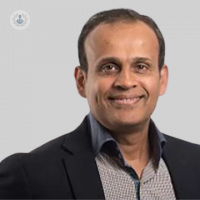FAQs on cholecystectomy
Written by:You may have recently been recommended to have a cholecystectomy and you might be looking for a second opinion. Luckily, one of the UK’s highly experienced consultant general surgeons, Mr Joseph Varghese, has answered some commonly asked questions to guide you.

We also found out if it’s wise to have a cholecystectomy during the COVID-19 pandemic or if this should be put on hold during these unprecedented times. Read on to find out.
What are the main reasons people have a cholecystectomy?
Majority of cholecystectomies (removal of Gall Bladder) is due to biliary colic (pain) secondary to gall stones. Although 1 in 10 people in the western world have gall stones, only a minority have symptoms requiring an operation.
Other reasons for surgery include an acute infection or inflammation in the gall bladder called cholecystitis. A minority of patients with gall stones end as an emergency with cholecystitis. There are some risk factor group such as diabetes and being overweight.
Are cholecystectomies still going ahead during the pandemic?
During this pandemic, all elective operations have reduced due to availability of operating theatres and to reduce the admission of patients to the hospital. Emergency surgery have continued to be performed during this period, although the numbers have reduced. Having an operation during the pandemic increases the risk of contacting a hospital acquired infection and subsequently complications secondary to it.
Recently, with the guidelines for self-isolation, elective or planned operations have begun. Patients that have been most symptomatic requiring multiple admissions or complications of gall stones (infection, jaundice, passage of stones into the bile duct (choledocholithiasis), pancreatitis) and those deemed urgent have gone on to have the procedure.
Can I have a cholecystectomy if I am pregnant?
During pregnancy there’s increased cholestasis (slowing of bile flow). Symptoms tend to improve and disappear after pregnancy in about 60%.
It is possible to have cholecystectomy during pregnancy. It is the second most common no-obstetrical operation. The risks of anaesthesia and surgery vary dependant on the trimester of the baby (4-40% of foetal loss). It is best to seek a specialist expertise if surgery is required during pregnancy.
What are the risks of a cholecystectomy?
A cholecystectomy carries a small risk of complications including:
- Bile leak (0.5%), Bleeding, Infection (1% Lap), Injury to nearby structures, such as the bile duct, liver, and small intestine
- Risks of general anaesthesia, such as blood clots, pneumonia, and cardiac complications (higher for open surgery)
Your risk of complications depends on your overall health and the reason for your cholecystectomy.
If you require a cholecystectomy, we recommend getting in contact with leading consultant general surgeon to ensure that you will be satisfied with the results. Click here to visit his Top Doctors profile today for information on appointment availability.


